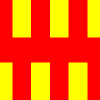Grammar Guide 5 - Pronouns
Welcome back! Last week we covered Adverbs and had a great little chat. We also touched on a way to spot "Show vs Tell" using adverb tells.
 This week, we hit pronouns.
This week, we hit pronouns.
A pronoun is a word that takes the place of a noun, usually for added variety and to avoid repetition.
Pronouns come in 8 different classifications, almost all of which make good "Words of the Day":
-
Personal - represent people, places or things
- Examples: I, me, you, he, she, they, her, it, we, us, them, they, him
- I walked the dog. He barked at the cat. She ran away from the barking dog.
-
Possessive- shows ownership
- yours, mine, hers, his, theirs, ours
- "That human is mine," said the cat. That dog is ours.
-
Demonstrative - Points to something
- this, that, those, these
- These cats have fur. Those cats don't have fur.
-
Relative - relate one part of the sentence to the other
- who, whom, which, that, whose
- The boy who was horny hooked up with a friend.
-
Reflexive - emphasize or reflect back to someone or something else
- myself, himself, herself, yourself, etc
- You must look at yourself in the mirror.
-
Indefinite - refers to a non-specific number to replace the noun(s)
- All, any, everybody, everything, few, many, etc
- Nobody was at work. Everyone stayed home.
-
Reciprocal - express mutual action
- each other, one another
- The boys yelled to each other across the playground.
-
Interrogative - asks a question
- who, what, whom
- What can I do in an emergency?
Thanks for checking out this week's blog. Drop some comments below. Are you finding these topics useful?
-
References:
- Kern, Jara. (2020). The Infographic Guide to Grammar. Adams Media
- Venolia, Jan. (2001). Write Right! (4th ed.). Ten Speed Press
-
 7
7
-
 6
6




8 Comments
Recommended Comments
Create an account or sign in to comment
You need to be a member in order to leave a comment
Create an account
Sign up for a new account in our community. It's easy!
Register a new accountSign in
Already have an account? Sign in here.
Sign In Now